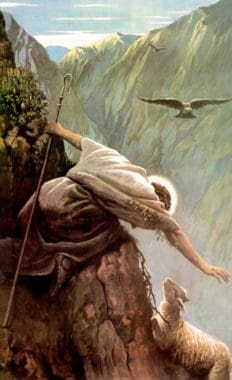On the Advent of Our Lord and Its Six Circumstances (Part II of III)
(from the Advent Homilies of Saint Bernard of Clairvaux, Doctor of the Church)
*
Advent’s Second, Third and Fourth Circumstances
Editor’s Note: In part I, we looked at the first of the six circumstances of Advent. Today we will continue our examination, by looking at Advent’s second, third and fourth circumstances.
*
Circumstances 2 and 3: Behold, you have heard Who He is that comes; consider now whence and to whom He comes.
 He comes from the heart of God the Father to the womb of a virgin mother; He comes from the highest heaven to this low earth, that we whose conversation is now on earth may have Him for our most desirable companion. For where can it be well with us without Him, and where ill if He be present? “What have I in heaven, and besides Thee what do I desire upon earth? Thou art the God of my heart and the God that is my portion for ever” (Psalm 73:25-26) and “though I should walk in the midst of the shadow of death, I will fear no evil,” if only “thou art with me” (Psalm 23:4).
He comes from the heart of God the Father to the womb of a virgin mother; He comes from the highest heaven to this low earth, that we whose conversation is now on earth may have Him for our most desirable companion. For where can it be well with us without Him, and where ill if He be present? “What have I in heaven, and besides Thee what do I desire upon earth? Thou art the God of my heart and the God that is my portion for ever” (Psalm 73:25-26) and “though I should walk in the midst of the shadow of death, I will fear no evil,” if only “thou art with me” (Psalm 23:4).
But here I see that our Lord descends not only to earth, but even to hell; not as one bound, but as free among the dead; as light that shines in the darkness, “and the darkness did not comprehend it.” Wherefore His soul was not left in hell, nor did His holy body on earth see corruption. For Christ “that descended is the same also that ascended…that he might fill all things” (Ephesians 4:10) “who went about doing good, and healing all that were oppressed by the devil” (Acts 10:38). And elsewhere we read, He “hath exalted as a giant to run his way…His going forth is from the highest heavens, and his circuit even to the end thereof” (cf Psalm 19:7). Well might St. Paul cry out: “Seek the things that are above, where Christ is sitting at the right hand of God” (Colossians 3:1). In vain would the Apostle labour to raise our hearts upwards if he did not teach us that the Author of our salvation is sitting in heaven.
But what follows? The matter here is indeed abundant in the extreme; but our limited time does not admit of a lengthened development. By considering Who He is that comes, we see His supreme and ineffable majesty, and by contemplating whence He comes, we behold the great highway clearly laid out to us. The Prophet Isaiah says: “Behold, the name of the Lord cometh from afar” (Isaiah 30:27). By reflecting whither He comes, we see His inestimable and inconceivable condescension in His descending from highest heavens to abide with us in this miserable prison-house. Who can doubt that there was some grand cause powerful enough to move so sovereign a Majesty to come “from afar,” and condescend to enter a place so unworthy of Him as this world of ours. The cause was in truth great. It was His immense mercy, His multiplied compassion, His abundant charity.
Circumstance 4: For what end must we believe that He came?
This question is the next in order to be examined; nor will the search demand much labour, for the end and purpose of His coming is proclaimed by His words and His works. To seek after the one sheep of the  hundred that had strayed He hastened from the mountains. For our sake He came down from heaven, that His mercies and His wonders might be openly proclaimed to the children of men. O wonderful condescension of God in this search! O wonderful dignity of man who is thus sought! If he should wish to glory in this dignity, it would not be imputed to him as folly. Not that he need think anything of himself, but let him rejoice that He Who made him should set so high a value on him. For all the riches and glory of the world, all that is desirable therein, is far below this glory–nay, can bear no comparison with it. “Lord, what is man that thou should magnify him? and why settest thou thy heart upon him?” (cf Job 7:17).
hundred that had strayed He hastened from the mountains. For our sake He came down from heaven, that His mercies and His wonders might be openly proclaimed to the children of men. O wonderful condescension of God in this search! O wonderful dignity of man who is thus sought! If he should wish to glory in this dignity, it would not be imputed to him as folly. Not that he need think anything of himself, but let him rejoice that He Who made him should set so high a value on him. For all the riches and glory of the world, all that is desirable therein, is far below this glory–nay, can bear no comparison with it. “Lord, what is man that thou should magnify him? and why settest thou thy heart upon him?” (cf Job 7:17).
I still further desire to know why He should come to us, and not we rather go to Him, for the need was on our side, and it is not usual for the rich to go to the poor, though otherwise willing to assist them. It was indeed our place to go forward to Him, but there stood a twofold impediment in the way; for our eyes were heavy, and He “dwelt in light inaccessible.” We lay as paralytics on our beds, and could not raise ourselves to the Divine elevation. Wherefore this most benign Saviour and Physician of souls descended to us from His lofty throne, and tempered His brightness to the weakness of our sight. He clothed Himself with His most glorious and spotless body as with the shade of a lantern, thus attempering to us His splendour. This is that bright and shining cloud upon which the Lord was to descend upon Egypt, as the Prophet Isaiah foretold. (cf Isaiah 19:1).
*
Editor’s Note: In Part III, we will conclude our survey of the the circumstances of Advent by exploring the fifth and sixth of Advent’s circumstances.
Art: The Nativity with God the Father and the Holy Ghost, Giovanni Battista Pittoni the younger, 1740; The Good Shepherd (also know as The Lost Sheep), Alfred Usher Soord, 1900; both Restored Traditions, used with permission.




